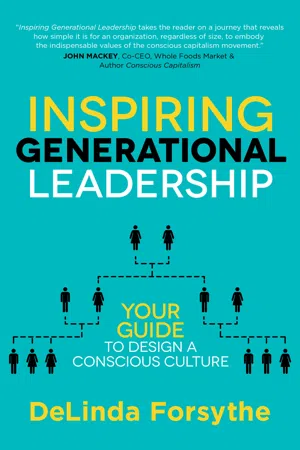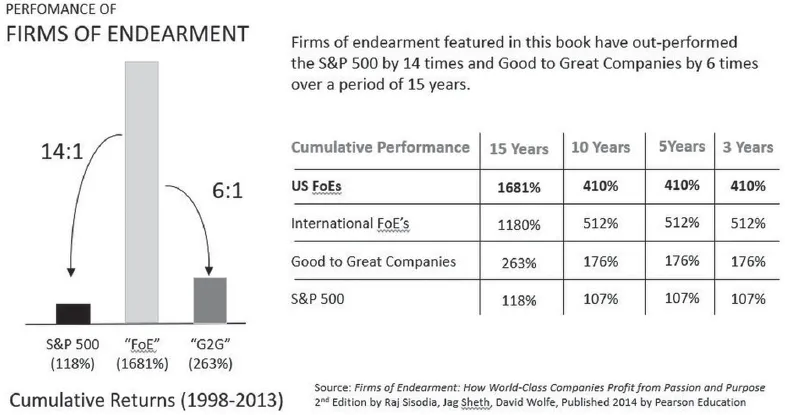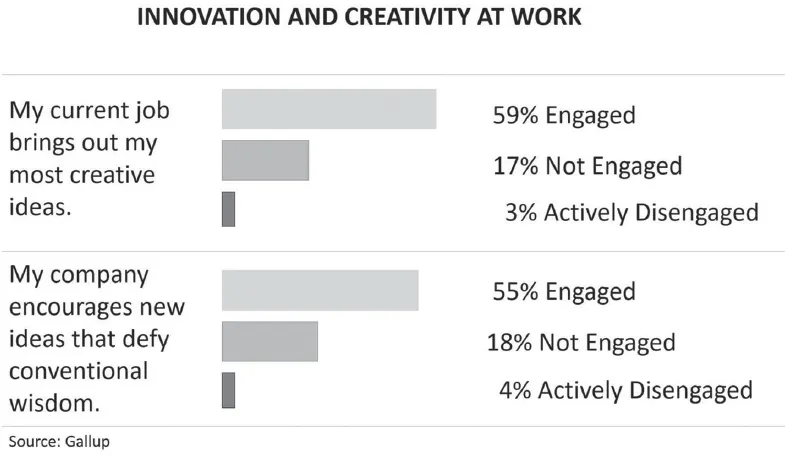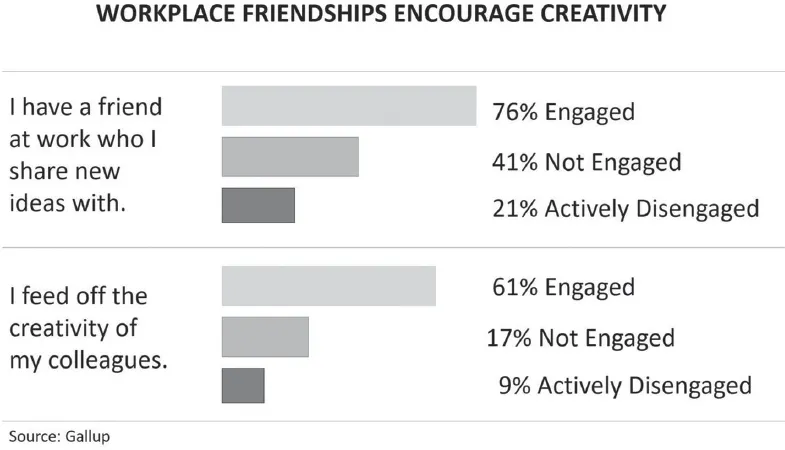![]()
CHAPTER 1
Conscious Capitalism, Millennials, and an Evolving Perspective
In 2006, I started my company, Innovative Commercial Environments (dba ICE), from a spare bedroom. The impetus for ICE was my son’s acceptance into Georgetown University. As a single mother with few financial options to help him achieve his educational goals, I was forced to try entrepreneurship. It was a leap of faith that has proven most fortuitous.
Exceeding Every Industry Standard—for Seven Consecutive Years
For thirty-five years, I’ve thrived in the highly competitive contract furniture industry because of my focus on ethics, service, and excellence. The office furniture industry is not renowned for adhering to the ideals I strive for; it is a compromised and unregulated industry, as I’ll cover in more detail later.
By far the most rewarding portion of my years of service has been opening ICE and contributing to it as CEO and founder. While the company has been successful, I’ve become increasingly curious about why we’ve experienced such unprecedented success.
ICE has consistently been named in the Top 100 Fastest Growing Companies in San Diego, but more astonishing has been our ability to rank as one of the 5000 fastest-growing companies in America, landing us on the Inc. 5000 Fastest Growing Companies list 2014–2020—a feat accomplished by only 1.5 percent of US companies. No other furniture dealership in America has been able to claim this accomplishment.
Some of our growth is attributable to our decision in 2013 to add hospitality and custom-designed, locally made furnishings to our scope of services, allowing us to expand our ability to furnish restaurants, hotels, nightclubs, etc. As the demarcation between work and personal life erodes, our office spaces have incorporated more personality and more residential sentiments, earning us several design awards and a developing reputation as “San Diego’s most creative office furniture dealership.”
In an industry that averages single digit growth, ICE has averaged 32 percent, and in 2019, we grew an astonishing 56 percent! We have experienced tremendous local brand recognition in addition to our explosive growth, which led me, in 2019, to ask, “Why?”
In 2017, ICE became an “aligned” Teknion furniture dealership. “Aligned” dealerships have far more success because they partner with major furniture brands; a partnership offers a substantially increased opportunity for stability and revenue generation than a “non-aligned” dealership. We were non-aligned for eleven out of fourteen years. Not to discount our company, but being non-aligned made our success even more unusual.
I had to wait patiently for the publication of Conscious Capitalism by John Mackey and Raj Sisodia, and Firms of Endearment by Raj Sisodia, Jag Sheth, and David B. Wolfe before I had something like an answer for our success. In these books, I discovered an explanation for why the ICE formula has proven so effective: We engage all of the principles and the philosophy of conscious capitalism.
The conscious capitalism movement brings a set of demands that are productive in reimagining enterprise as a constructive social vehicle and free markets as a social good in-themselves. The overlap of Millennial values and the tenets of conscious capitalism are remarkable when considered through Conscious Capitalism’s definition of business’ purpose:
The authentic truest purpose of business is to elevate humanity and create value for all stakeholders.
The four principles of conscious capitalism are:
- Core values are the heart of an engaging higher purpose.
- Fully integrated equal stakeholders are critical to the company’s success; consequently, equitable achievement is realized for all stakeholders.
- All leaders and managers must embrace conscious leadership.
- The company has an active conscious culture.
The majority of the ICE workforce is in the Millennial age group. Millennials are projected to continue being a substantial majority of the world’s workforce. Understanding their beliefs is critical for business leaders who want to motivate and manage this segment of the workforce. Millennials profess to enthusiastically embrace the tenets of conscious capitalism, and this alignment offers more potential for the movement to succeed. Millennial engagement is as much a factor in the emergence of conscious social enterprises as those identified in Firms of Endearment or Conscious Capitalism. The aging Boomer demographic in America has also been influential in this shift. Boomers, either retired or seeking legacy and purpose, appear to want to modernize the purpose of business, desiring and resulting in a more humanistic vision of capitalism, a seismic swing in consciousness that is shifting the basis of American society.
In 2020, COVID-19, followed by civil unrest seeking racial equity and societal change, further catapulted the desire for a much-needed evolution of capitalism. In the context of this change, I have reflected upon my own experiences, and I offer them in this book in my desire to share information and advance conscious capitalism, which I believe may be the most universally preferred way forward for the free-market system and businesses in America.
One of the most compelling reasons to adopt the concepts noted in Firms of Endearment and other books that promote conscious capitalism is that they are more resilient during times of crisis and turbulence and, surprisingly, they are far more profitable! The following chart clearly confirms that the organizations documented in Firms of Endearment are actually fourteen times more profitable than the S&P 500! Organizations only focused on profit have much to gain from adopting the tenets of conscious capitalism.
The year 2020 proved to be unrelenting, with persistent, irrepressible outside forces that felt intent on destroying not only the free market system, but the fabric of what America considers to be American—the worth of the individual. It was the worst financial year not only for ICE but in US history; it was ICE’s only negative growth year in fourteen years. By April, we realized we had to recalibrate how we defined success and elevate our organization’s purpose. Our main goal was to avoid layoffs, which we were able to do despite more than a 50 percent loss in revenue. We place an enormous value on human capital, so our definition for success in 2020 became: Lose as few people as possible!
We have devoted extraordinary time, thought, and care to embedding into our corporate culture values that resonate with Millennials: equal opportunity, workplace family, ethical business practices, and the immeasurable value of an individual. Years of developing our passionately engaged culture reaped enormous positive consequence and an aura of resilience, despite the business turmoil of 2020. We indelibly proved that a culture built on trust and the value of human dignity and fairness can far better withstand massive outside forces.
According to the Small Business and Entrepreneurship Council, businesses with less than 500 employees employ 46.8 percent of the labor force. In total, 99.7 percent of US companies have less than 500 employees and are considered small businesses. The year 2020 revealed the fragility of minority-owned businesses as more than 40 percent of Black-owned businesses shut their doors due to the COVID-19 pandemic.2
Small businesses not only have the responsibility to positively influence change, but it is in their best interest to do so if they want to attract the highest caliber of talent and create organizational resiliency during economic downturns. Business’ purpose has evolved, and we have the opportunity to understand how we can positively influence future generations and affect significant transformation.
Conscious Capitalism 2.0
The 2019 Deloitte Global Millennial Survey noted that both Gen Z and Millennials feel “government has the most responsibility for improving social mobility.” The unfortunate truth is that government has never been able to provide income equality without substantial cost to long-term economic growth, innovation, and most significantly, human freedom because socialist and communist influenced governments value the “collective,” not the individual.3 Consider the loss of constitutional rights and the lack of caring for the individual reflected in decisions government made in 2020. As the data continues to emerge, the loss of life due to drug overdoses and suicide, especially teenagers and even those under fifteen, was unprecedented. Is this reflective of our government making sound decisions?
Our advanced and imperfect American economy developed as a result of our free market system, which has reduced poverty and expanded opportunity more effectively than any previous economic system. Alternatively, non-capitalistic government systems have failed dramatically; thus, it is concerning that so many in the current generation may be laying their hopes on such proven failed strategies.
Our Founding Fathers sought to lay the foundation of a governmental structure from which a more perfect union could evolve. Like all humans, the Founding Fathers were flawed, but in many ways, they were extraordinary visionaries. They envisioned a government and country that improved through generational wisdom in understanding and learning from our internal failures as well as the failures of other countries and governments. Our guiding American political philosophy is based on liberty, inalienable individual rights, and the sovereignty of the people as the source of all authority in law. The Founding Fathers rejected aristocracy. They expected their citizens to be virtuous and to disallow corruption. Integrity is needed for the free-market system to optimally function. What they created was more than a form of government; it was a way of life, a core ideology, and an uncompromising commitment to liberty.4
In many ways, capitalism has failed our Founding Fathers’ expectations, but that should be expected as we continue to evolve and learn from our mistakes, always seeking opportunities to improve and progress. As the ancient Greek philosopher Heraclitus noted, “The only constant in life is change.” If anything good has emerged from 2020, it’s an extraordinary opportunity for much-needed structural change to happen so we can better realize the original vision of our country’s founders.
Markets depend on more than just businesses to function. They need the buy-in and support of people. We can and should mentor our next generation of leaders through an enhanced dialogue about a reimagined capitalism that embraces the tenets of conscious/social/stakeholder capitalism, reinforces free markets against the counter winds of bad economic ideologies, and seeks more inclusion on issues of gender and racial parity, sexual orientation, and social justice.
The growing conscious capitalism movement offers the brightest hope for America’s future. Free and fair markets are good, very good—they reflect capitalism as originally imagined by our forefathers! We have indeed strayed from our Founding Fathers’ intent; it’s time to reembrace these fundamental principles and reclaim what is rightly our American heritage.
Creating Space That Transcends Ordinary
The driving thread woven throughout this book is the unlimited and focused efforts ICE has put into creating safe emotional space. It has been the company’s foundation and driving mission from day one. We’ve done this intuitively, but data consistently confirms the veracity of an emotionally safe workplace. Shelley Mika, as discussed in her article “The Four Drivers of Innovation,” published on Gallup’s website, studied why leading executives and management thinkers believe an empowered, participatory work environment produces increased innovation. Innovation is fostered by creativity and has become “the most important driver of macroeconomics today.”5
Jim Clifton, Gallup Chairman and CEO, provides an overview of what drives innovation today, as well as what differentiates creativity (ideas) and innovation (action). Clifton notes that “Better doesn’t work anymore. Different does.” For organizations to thrive in today’s highly competitive workplace, they must truly stand out.
ICE’s well-established brand of an ethical company supported within a trusting culture thrives because of the four drivers Mika identifies:
- Finding and fostering talent: This happens when people are relaxed and energized by the creativity of their colleagues and the subsequent friendships that develop.
- Managers matter: Managers who are not just inspirational but “super mentors” play a key role in inspiring mentees and connecting them with others who can activate their ideas and foster their growth. This is critical to organizational success.
- Relationships matter too: Internal relationships among managers and coworkers are power drivers of innovation, so finding ways to build these internal relationships is as critical as building tenacious relationships with customers. Powerful internal relationships and friendships are what make a company “different.”
- Keeping the right leaders: Effective, highly engaged CEOs who are identified as the company’s unique driving success are not easy to replace. When they leave, especially due to retirement, it can be highly disruptive and lead to the displacement of key employees.
The charts that follow clearly illustrate the magnitude of these metrics. They reflect workers’ responses to statements about their work experiences.
Personal Relationships Within the Workplace
When ICE was first created, we had a tough time finding industry-skilled hires; we were too much of a gamble for them to want to work with us. My second hire in 2008 was Alysse McCree (now Cooper), the daughter of my former fitness instructor and current bookkeeper, Marylyn McCree. This book is as much about Alysse’s journey, perhaps even more so, as it is about mine.
Alysse was twenty when she started working for me and attending California State University San Marcos (CSUSM). She needed full-time, flexible hours so she could attend school daily and I needed a receptionist/ office manager/sales assistant. Alysse worked odd hours, coming in and leaving when it was still dark outside, working weekends—anything to get in her hours. Early on, it was clear she had a phenomenal work ethic.
Over the years, Alysse has hired family, friends, and industry colleagues who have helped create our workplace family culture, which will be discussed in Chapter 4. Many of our employees were personal referrals of current employees; it’s a very common thing at ICE for friends to recruit friends. When you love wher...




